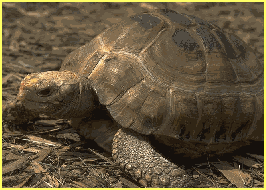|
This tortoise's natural range includes Thailand, India, Bangladesh, Nepal, south China, Myanmar, Laos, Vietnam, Malaysia and Kampuchea. The head is pale yellow except in the breeding season when both sexes undergo a colour change to feature pink hues around the eyes and nostrils. In the wild, I. elongata typically occurs in teak forests where the humidity is high, although it is also found in hot dry conditions. It is most active during the early part of the rainy season (when breeding also occurs). Some keepers report that I. elongata is most active at dawn and dusk, when it can be observed hunting for food. This tortoise typically avoids strong sunlight, and does not normally seem interested in basking facilities (although, given its wide distribution, regional preferences may exist). As in the wild, peak activity is often seen following heavy, warm, summer rain. Daytime environmental temperature should be maintained in the 26 - 30°C region during summer (78 - 86 °F). In winter, daytime temperatures can be reduced to 24 °C (75 °F) . At night, temperatures can be reduced to around 18 °C (65 °F). This tortoise regularly takes snails, slugs and worms in addition to green leafy material, fruit and vegetables. A bathing pool is essential, as Indotestudo elongata is known to drink copiously and likes to sit, half-submerged, for several hours at a time. In the wild, fallen fruits are believed to comprise a high proportion of its diet. Many keepers provide a diet rich in prepared meats such as dog food for I. elongata, but this is probably inappropriate. Only a small amount of low fat animal protein (such as rehydrated cat pellets with added vitamins and calcium) is provided on an irregular basis to the Elongate tortoises in the Tortoise Trust collection. This appears to be entirely adequate and is more conducive to long-term good health.
Further details on keeping Elongate tortoises are available from the Tortoise Trust
|
|



